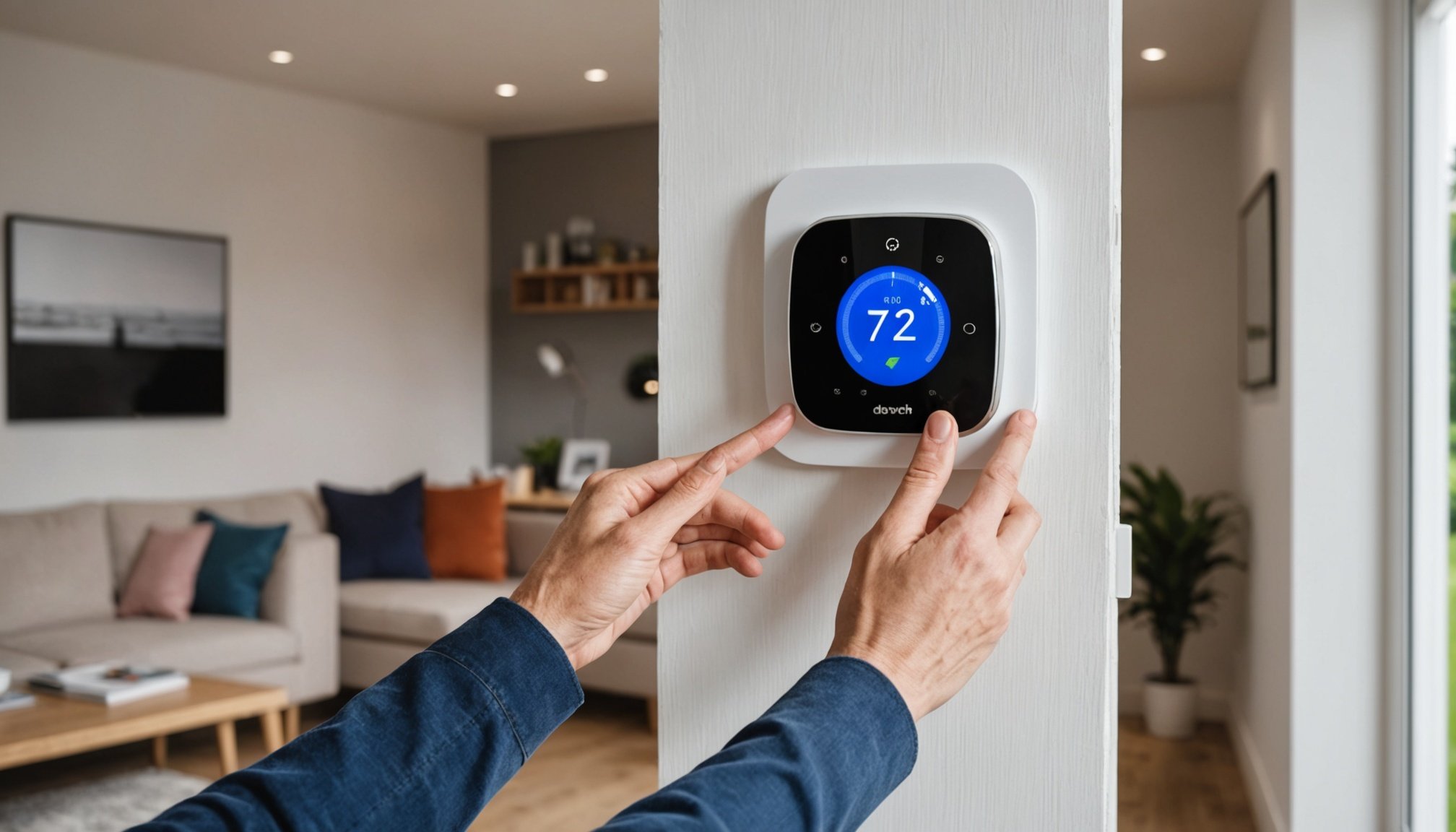Overview of Energy-Saving Smart Home Devices in the UK
Energy-saving smart home devices are revolutionizing the way households in the UK manage their energy consumption. These smart technology gadgets are designed to optimise energy use, reduce utility bills, and promote environmental sustainability. By incorporating various methods of intelligence, such as sensors and automation, they allow for more efficient home automation.
The importance of energy-saving smart home devices cannot be overstated in the push for greener living and cost efficiency. They facilitate the automation of routine tasks such as thermostat adjustments, lighting controls, and appliance management, leading to substantial energy conservation. The integration of these devices promotes convenience and a personalised living environment while minimizing environmental impact.
En parallèle : The best insulated water bottle with straws for every need
As for market trends, the UK has witnessed a noticeable rise in the adoption of smart home technology. Consumers are increasingly aware of the financial and environmental benefits, leading to an uptick in the use of energy-efficient solutions. This surge is supported by advances in technology and enhanced affordability.
Key benefits of incorporating smart home devices include reduced energy consumption, lower utility bills, and convenience in managing home activities with minimal effort. With energy costs on the rise, harnessing the power of energy-saving smart home devices is becoming an attractive option for households across the UK.
Lire également : Top Eco-Friendly Kitchen Countertop Materials in the UK: A Guide to Sustainable Choices
Top Energy-Saving Smart Home Devices
Transitioning to energy-efficient gadgets in your home not only reduces your carbon footprint but can also lead to significant savings on utility bills. Here’s an exploration of some of the best smart home devices to consider.
Smart Thermostats
Smart thermostats are revolutionising home heating systems. By learning your schedule, these devices optimise energy usage, significantly reducing wastage. Some popular models in the UK market include Nest, Hive, and Ecobee. These devices can cut energy costs by up to 25%. The installation process is straightforward, often taking less than an hour and can be done by most users themselves.
Smart Lighting Solutions
When it comes to smart lighting, options abound, from bulbs to switches and strips. These systems can be controlled remotely, allowing you to maximise energy efficiency by turning off or dimming lights when not needed. Users have reported savings of up to 80% on lighting bills when implementing smart solutions.
Smart Plugs and Power Strips
Smart plugs and power strips empower homeowners to manage the energy consumption of individual devices. By scheduling when devices are powered on, they prevent the unnecessary draw of electricity, also known as vampire power. Belkin and TP-Link are two highly recommended brands offering user-friendly pricing options.
Energy Conservation Tips for Smart Home Technology
Achieving energy efficiency in your smart home doesn’t have to be complicated. Here are some energy conservation tips to help you optimize smart devices efficiently:
Firstly, embrace automation. Smart thermostats can learn from your habits, adjusting temperatures when you’re asleep or away, which can substantially decrease energy usage. Additionally, smart plugs can automatically switch off appliances when not in use, further reducing energy waste.
Secondly, to optimize smart devices properly, schedule them to operate during off-peak hours. This reduces strain on the electrical grid and often results in cost savings due to lower tariffs during these times.
Avoiding common pitfalls is also crucial for maximizing energy savings. One frequent error is leaving smart devices like lights or speakers in ‘standby’ mode. This standby power consumption, often called ‘phantom load,’ can add up over time, so it’s best to unplug or completely power off when not in use.
Furthermore, ensure your smart devices receive regular firmware updates. This not only improves functionality but also ensures they’re running with the latest energy efficiency protocols. By paying attention to these practices, your smart home can be both innovative and sustainable.
Pricing and Budget Considerations
When planning a smart home budget, it’s essential to understand the UK pricing and evaluate which devices offer the best value. Smart home devices, especially those designed for energy savings, can vary significantly in price, with ranges typically from £50 to over £300 per device, depending on the features and brand.
Investing in energy-saving technology can prove cost-effective in the long run. Initially, these devices might seem costly, but they are engineered to reduce utility bills by optimizing energy consumption. For instance, energy-efficient thermostats can adapt their operation to your schedule and preferences, leading to substantial savings on heating bills over time.
For the budget-conscious consumer, consider the following tips to maximize potential savings:
-
Prioritize devices that serve multiple functions, such as a smart speaker that also acts as a central hub for other devices.
-
Look for promotions and bundle deals that offer multiple devices at a reduced rate.
-
Evaluate the energy-saving ratings of appliances, as higher efficiency often translates to better long-term savings.
Smart investment in energy-efficient devices can make your household environmentally friendly while reducing expenses, justifying the initial outlay through their cost-saving potential.
User Testimonials and Case Studies
Smart home devices have transformed how individuals manage their environments, as evidenced by user experiences across different settings. Many users report notable energy savings, attributing this to the adaptation of smart home devices, such as smart thermostats and lighting systems. These devices automatically adjust settings based on the user’s habits, significantly reducing energy consumption.
In terms of smart home testimonials, customers commonly express high satisfaction with the convenience and control these devices offer. For instance, a case study involving a mid-sized home in London highlighted a 25% reduction in electricity bills over a year after integrating smart devices. This example illustrates the potential economic benefits that these technologies provide.
Several case studies explore product reliability and user satisfaction further. Most findings indicate that consumers appreciate both the innovative solutions and simplicity of use that smart devices introduce into their daily routines. Nevertheless, some feedback points to occasional connectivity issues, which can temporarily affect device reliability.
Overall, the satisfaction is generally high, as users find products dependable and efficient in delivering promised outcomes. This suggests that the benefits of smart home technologies generally outweigh potential drawbacks, encouraging more individuals to transition towards smarter living solutions. Tracking long-term savings and consistent user feedback remains crucial for improving smart home devices.
Where to Buy Energy-Saving Smart Home Devices
In the United Kingdom, purchasing smart home devices has become increasingly popular due to their energy-saving benefits. UK retailers offer a range of options, both online and in-store, catering to diverse customer needs. Engaging in online shopping not only provides convenience but often includes exclusive offers. Below are recommended channels to consider:
Online Retailers
Amazon UK: A key player, Amazon UK offers an extensive range of smart home devices, often featuring competitive pricing and Prime delivery options for speed and reliability.
Currys PC World: Known for electronics, their website includes a vast collection of smart home technology, accompanied by customer reviews and detailed specifications to help you purchase smart home devices with confidence.
Major UK Retail Chains
John Lewis & Partners: Trustworthy for quality, their offerings blend functionality with aesthetics. They carry various brands and often provide extended warranties, ensuring customers have peace of mind with their purchases.
Argos: Accessible and convenient, Argos allows for quick and straightforward purchasing of smart home devices. The option to reserve online and collect in-store offers flexibility compared to traditional online shopping.
Each of these retailers provides unique advantages and an array of choices, making it easier to explore and find devices that suit your specific energy-saving needs.











